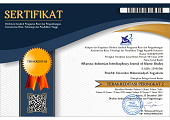Pornography in Diversity: A Study of the MUI’s Fatwa on Pornography
Abstract
Keywords
Full Text:
PDFReferences
Allen, Pam. 2007. “Challenging Diversity?: Indonesia’s Anti- Pornography Bill”. Asian Studies Review, Vol. 31, No. 2, pp. 101-15.
Al-Anshari, Fauzan. 2006. Pornografi No RUU APP Yes. Hujjah Press.
Andren, Kim. 2007. “Prostitution, Pornography and Islamic Law: Women’s NGOs Confronting Islamic Conservatism in Post-Authoritarian Indonesia (Thesis)”. The University of Sydney.
Armando, Ade. 2004. Mengupas Batas Pornografi. Jakarta: Kementerian Pemberdayaan Perempuan Republik Indonesia.
Asti, Budiatul Muchlisin. 2004. Remaja Dirantai Birahi: Kupas Tuntas Pornografi dalam Perspektif Islam. Bandung: Pustaka Ulumuddin.
Barendregt, Bart. 2006. “Between M-governance and Mobile Anarchies: Pornoaksi and the Fear of New Media in Present Day Indonesia” (A Paper). Leiden University.
Barker, Thomas. 2006. “VCD Pornography of Indonesia,” in Adrian Vickers and Margaret Hanlon (eds.), Asia Reconstructed: Proceeding of the 16th Biennial Confer- ence of the ASAA, Wollongong, Australia.
Cholil, Suhadi (ed.). 2008. Resonansi Dialog Agama dan Budaya. Yogyakarta: Center for Religious and Cross- cultural Studies (CRCS).
Djakse, Sukmadewi. 2006. RUU APP Bukan Tiket ke Surga. Srikandi Demokrasi Indonesia.
Djubaedah, Neng. 2003. Pornografi dan Pornoaksi Ditinjau dari Hukum Islam. Jakarta: Kencana.
Donnerstein, E. Linz, D. et al. 1987. The Question of Pornography: Research Findings and Implications. New York and London: The Free Press.
Hawkins, Gordon and Franklin E. Zimring. 1988. Pornogra- phy in a Free Society. Camridge: Cambridge University Press.
Höpfner, Maren. 2009. Das Pornografie-Gesetz in Indonesien: eine Gefahr für den Pluralismus? Journal of Current Southeast Asian Affairs, 28 (1), 31-45.
IAIN Syarif Hidayatullah. 1992. Ensiklopedi Islam Indonesia. Jakarta: Djambatan.
Kaptein, J.G., Nico. 2004. The Voice of the ‘Ulama: Fatwas and Religious Authority in Indonesia (Working Paper). Singapore: Institute of Southeast Asian Studies.
Kruschwitz, Robert B. (ed). 1989. The Pornographic Culture: Christian Reflection. Texas: Baylor University.
Rahim, Alex A. (ed). 1977. Pornografi dalam Pers Indonesia: Sebuah Orientasi. Jakarta: Dewan Pers.
Sekretariat Majelis Ulama Indonesia. 2003. Fatwa MUI tentang Pornografi dan Pornoaksi. Jakarta: Lembaga Informasi Nasional.
Soebagijo, Azimah. 2008. Pornografi: Dilarang tapi Dicari. Jakarta: Gema Insani.
Yogi, P.G. 1998. “An Analysis of Tantrayana (Vajrayana).” Bulletin of Tibetology, Vol. 3, No. 3, pp. 16-38
DOI: https://doi.org/10.18196/aiijis.2013.0022.95-111
Refbacks
- There are currently no refbacks.
Copyright (c) 2013 Afkaruna: Indonesian Interdisciplinary Journal of Islamic Studies

This work is licensed under a Creative Commons Attribution-ShareAlike 4.0 International License.
Afkaruna: Indonesian Interdiciplinary Journal of Islamic Studies indexed by:












1.png)


